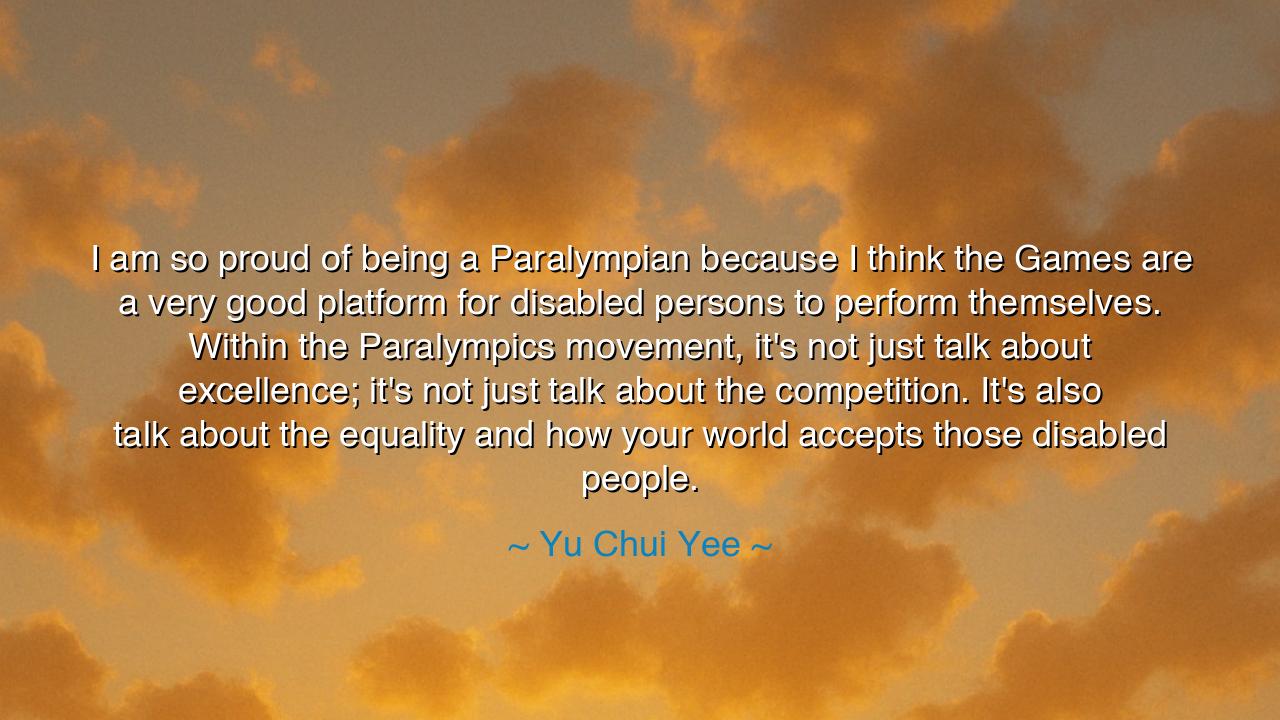
I am so proud of being a Paralympian because I think the Games
I am so proud of being a Paralympian because I think the Games are a very good platform for disabled persons to perform themselves. Within the Paralympics movement, it's not just talk about excellence; it's not just talk about the competition. It's also talk about the equality and how your world accepts those disabled people.






In the great arena of life, where human achievement is often measured by strength and ability, there is a profound truth that emerges in the words of Yu Chui Yee: "I am so proud of being a Paralympian because I think the Games are a very good platform for disabled persons to perform themselves. Within the Paralympics movement, it's not just talk about excellence; it's not just talk about the competition. It's also talk about equality and how your world accepts those disabled people." These words carry within them the echo of a revolutionary spirit, a call to recognize that true greatness is not found in the physical perfection of the body but in the courage, resilience, and dignity of the human spirit, no matter the shape, form, or ability.
Yu Chui Yee speaks not only of the Paralympics as a stage for extraordinary athletic feats but as a platform where the world is forced to reconsider its view of disability. In her eyes, the Paralympics is a space where individuals who are often marginalized or overlooked by society are given a chance not just to compete, but to excel, to demonstrate the untapped potential of the human body and mind. For too long, society has defined value by what the body can do in terms of strength, speed, and dexterity. The Paralympic Games, however, offer a new lens through which we may view the human spirit—not as diminished, but as unbreakable, capable of rising above any adversity, and achieving what was once deemed impossible.
In ancient times, the Greeks celebrated the physical strength of the human body through the Olympic Games, which were considered the pinnacle of human achievement. However, there was another, less known tradition—the Special Olympics, which had roots that were not always celebrated, but that ultimately taught the world to view those with disabilities as heroes of their own right. It was through the untiring efforts of those who overcame tremendous obstacles that we began to shift our understanding of ability. The world began to understand that true strength lies not only in the sheer power of the limbs but in the heart, the will, and the mind that drives those limbs forward, even when the body itself may falter. Just as Hercules was a symbol of strength, so too are the Paralympians symbols of resilience—their achievements are not marked by perfection but by the courage to defy limitations.
Yu Chui Yee’s words also bring forth the critical notion of equality—a word that has often been spoken but too rarely realized. The Paralympics are not just about showing that people with disabilities can compete, but that they are equal to others in the pursuit of excellence, in the striving for victory, in the pursuit of greatness. Equality here does not merely mean the right to compete; it means being valued, being recognized as capable and deserving of respect in the same way as anyone else. The Paralympics have become a powerful symbol of the truth that every human being, no matter their physical limitations, has the capacity to contribute, to shine, and to leave a lasting impact on the world.
Consider the ancient story of Blind Homer, who, though unable to see, composed some of the most enduring works of literature in the Western world, such as the Iliad and the Odyssey. Homer’s ability to create such monumental works of art despite his disability is a testament to the fact that limitation does not equate to inability. It is a reminder that those who are often overlooked or marginalized have untold riches of spirit, creativity, and talent that can shape the world in ways that those who are considered "whole" may never fully comprehend. Homer, like the Paralympians, transcended the idea of disability and showed the world that true excellence is about how one rises to meet the challenges of life, not what one is given or denied.
What then is the lesson to be drawn from Yu Chui Yee’s reflection? It is that equality is not just about rights—it is about recognizing the intrinsic worth of every individual, regardless of their perceived limitations. The Paralympics challenge us to rethink how we value human beings, to measure success not by the standards of the able-bodied world, but by the courage, determination, and spirit that rise within those who face adversity. True equality is not the absence of differences, but the celebration of diversity—the recognition that all people, regardless of their abilities or disabilities, have something extraordinary to offer.
So let us take these words to heart. Let us not view those with disabilities through the narrow lens of what they cannot do, but through the expansive lens of what they can accomplish. Let us celebrate the Paralympians, not just for their athletic prowess, but for the example they set—showing the world that the human spirit can overcome the greatest obstacles. And as we live our own lives, let us strive to create a world where equality is not just a lofty ideal but a daily practice, where every individual, regardless of their abilities, is given the opportunity to show their true worth and potential. For in this, we honor not just the Paralympian but the very essence of what it means to be human.






AAdministratorAdministrator
Welcome, honored guests. Please leave a comment, we will respond soon